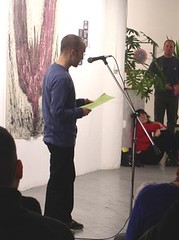When Mark Linenthal first introduced George Oppen to Robert Duncan, Oppen’s first words were, “Robert, I want to talk with you about your vowels.” When, on the plane to
What washes over, hovers lower.
He admires the shades,
stares at shadows for hours. Neither oblique nor orphic,
this sense of oblivion.
Of course metamorphosis. & how obvious to crack, crumble,
OK, but please don’t sink, slip, split,
disappear.
That is the second section, from a total of five, of “Phantom Planet,” one of the poems here in verse. At times, in the prose poems, the effect is even more dense:
Portents of nonporous borders sweep between sleep and sickness, gently exfoliating all skin types, toking on lowly hash pipes, indulging our decadence in the face of dastardly disaster as Klaxons click off at a clap.
Which is the 11th piece in a larger series entitled “False Correspondences,” which harkens specifically of work that Robert did in the very early 1950s, prior to the emergence of Opening of the Field.¹ And the deliberate use of the abbreviated “w/in” is itself a marker that Duncan was in McCreary’s mind at the time this was written.
Like Robert’s work, this is stuff that people are either going to relish or despise. There is not much room for a middle ground. In the first passage above what happens referentially is nothing. It might as well be the confession of a hash smoker, stunned into a gentle oblivion. The second passage carries extends that same sense even further.
This book feels looser & more free than the work of McCreary’s I’ve read previously, less worried about perfection & more open to whatever comes. As a result, tho it is not a thick book (unpaginated but almost certainly no more than 80 pages), it feels quite full, as if capable of looking in all directions, even when, as in these passages, it is taking a private account of material close at hand, often no further than the ear.
I’m on the relish side of that either/or bar myself, intrigued most, I think, not when he follows his ear, but those instances when he turns away from its potential for predictability, the way, in the first passage above, that final word disappear redeploys those clotted s & p sounds from the previous lines, letting it end on an open r. The other element I trust completely, tho I’ve seen it before in his work, is the twinkle of his wit, that wonderfully o’er the top dastardly disaster in the prose piece above, the deprecation of this barely varied scheme.
My sense – and this is a presumption – is that this book, even tho a step forward from McCreary’s earlier books, remains preparatory to an as yet unannounced (undreamed?) major project that he is still carefully stalking out. I find myself held where he is today, looking forward greatly to where he’s going to be in, say, another ten years.
¹ Tho there is evidence that a draft of the title poem of that 1960 breakthrough volume was first written some around 1953.






